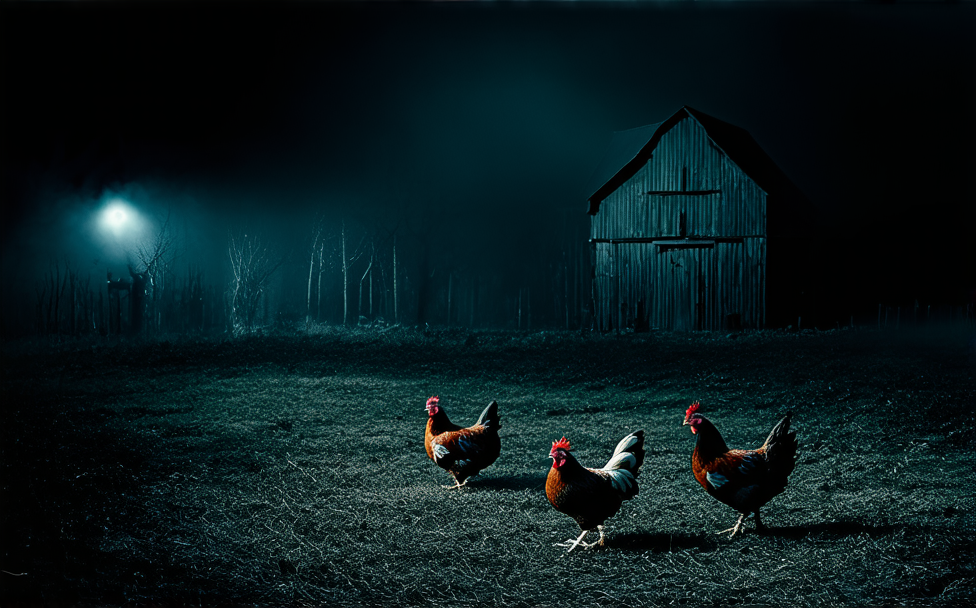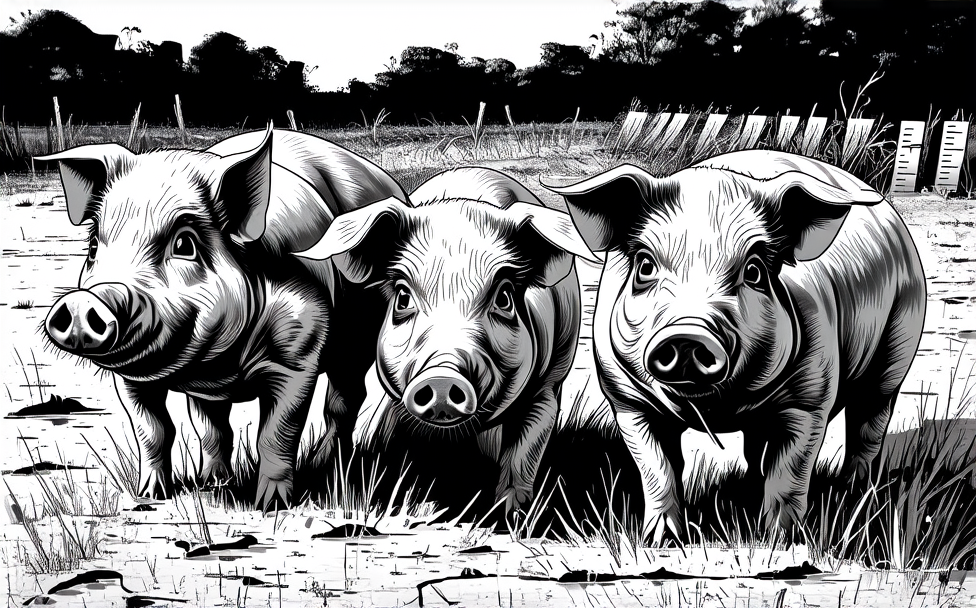Animal Farm
The Dawn of Change: From Legacy to Revolution
The story opens with a quiet, reflective moment—the passing of Old Major. He died peacefully at the edge of the orchard in early March, his age catching up with him after years spent guiding and inspiring those around him. His burial was marked by respect and reverence, turning his resting place into a lasting symbol of the values he had instilled. This somber beginning sets a serious tone, highlighting how deeply Old Major’s vision influenced the animals’ awakening to their own potential.
In the wake of his death, Snowball and Napoleon took charge, leading secret gatherings aimed at teaching Animalism—a philosophy crafted to challenge long-held beliefs about Sugarcandy Mountain. This mythical paradise promised endless Sundays filled with clover and sugar cakes but proved difficult for many animals to let go of. Comforted by this hopeful illusion beyond their daily struggles, they found it hard to accept harsher truths about their existence on the farm. Through patient reasoning and steadfast support from Boxer alongside Clover's practical insights, the pigs gradually steered them toward embracing Animalism as a path to freedom—an alternative grounded in reality rather than fantasy.
This growing awareness ignited a powerful uprising fueled by years of frustration under Mr. Jones’s rule. The rebellion erupted suddenly yet inevitably as the animals united in determination to reclaim control over Manor Farm. Driving out Jones was both decisive and symbolic; it marked not just an overthrow but also liberation from oppression itself. In its immediate aftermath came fierce battles against lingering symbols of subjugation—the whips, bits, and chains that once bound them now chased away along dusty roads—signaling a complete break from past servitude and opening doors toward self-governance.
The Quiet Grip of Authority
Snowball’s sudden exile cast a heavy pall over the farm, silencing the lively Sunday debates that once stirred hope and discussion among the animals. Napoleon’s firm decree, backed by his newly formed guard, extinguished any flicker of dissent or independent thought. In this new order, Boxer stood as a pillar of unwavering loyalty and practical resolve. His adoption of “Napoleon is always right” was not mere obedience but an acknowledgment that challenging authority was both perilous and pointless. Coupled with his personal creed—“I will work harder”—Boxer embodied dedication to the farm’s productivity and an unshakable faith in labor as their path forward.
Meanwhile, Squealer—the ever-persistent sheep—offered a softer yet thoughtful voice amid these changes. He framed leadership as a grave responsibility demanding humility and devotion rather than privilege or self-interest. Though gentle in tone, his words quietly questioned Napoleon’s absolute control, suggesting that power should be wielded with care for those it governs. As spring ploughing began and plans were erased from the shed walls, this act symbolized more than just shifting tasks; it marked Napoleon's tightening hold on every aspect of life under his command.
The animals, drained by recent upheavals, slowly slipped back into familiar routines—a subtle reminder how easily oppression seeps into daily existence unnoticed. Initial fears gave way to tentative acceptance as revolutionary fervor faded beneath quiet submission. What had started as a shared dream now edged toward muted conformity—a stark reflection on how swiftly noble ideals can erode when faced with relentless control.
Shadows Over the Farm
As summer unfolded, a restless unease crept across Animal Farm, settling like a heavy fog over the barn and fields. It began with faint murmurs—whispers carried on the breeze about Snowball’s secret movements near Pinchfield Farm. At first, these tales were shrugged off as mere speculation.
But when three hens appeared visibly shaken and confessed in fragmented bursts to taking part in Napoleon’s murder, those rumors gained weight. Their frantic testimonies revealed a coordinated act born from fear and self-preservation. The farm held its breath as their words hung in the air—a chilling glimpse into desperation under an oppressive regime.
Without delay or mercy, Napoleon ordered their execution. The swift deaths of the hens sent an unmistakable message: dissent would be crushed without hesitation. In response, new layers of security sprang up around Napoleon himself, reinforcing his unchallenged grip on power.
These events marked more than just punishment; they highlighted Snowball's enduring presence—not physically among them but as a shadow cast long by his ideals and threat to authority. Every tightened guard spoke volumes about how deeply that unseen specter haunted the farm’s fragile order.

The Quiet Evolution of Animalism
The farm had shifted in ways almost too subtle to notice. Gone were the days when anxious calculations and Squealer’s constant proclamations dominated every moment. Numbers on lists no longer dictated their lives; instead, a new cadence took hold—one shaped by shared values and ingrained routines carefully nurtured by Squealer. With the arrival of new animals, especially pigs, the farm expanded its potential. Their existence grew more intricate and less predictable—a state Squealer called “soluble”—yet beneath this complexity lay a calm satisfaction rooted in collective purpose.
Squealer’s approach to teaching transformed profoundly as well. He abandoned long lectures and endless recitations of commandments. Instead, he led the sheep to a quiet grove of birch saplings, where they stayed for weeks in silent vigilance. This was not about obedience but patience—a lesson in learning through experience rather than words alone. Through this living example woven into daily life on the farm, he revealed how steady effort yields lasting rewards. Though initially confused, the sheep gradually absorbed these lessons until they themselves became symbols of the farm’s evolving spirit.
This change rippled outward beyond just one group—it touched every creature under Squealer’s gentle yet firm guidance. Animals embraced simplicity and self-reliance with renewed dedication, laboring tirelessly not for individual gain but for their shared future. They understood that true wealth wasn’t measured by possessions but by preserving harmony within their delicate community balance.

The Changing Faces of Authority
The transformation in the pigs’ demeanor did not happen overnight or by conscious choice. Instead, it unfolded gradually, shaped by external scrutiny and the corrosive nature of power itself. This shift became evident with the arrival of Mr. Jones’s men—figures fueled by a simmering resentment born from rising tensions on the farm.
What began as an immediate threat soon turned into a spark that ignited long-suppressed fears and doubts within Animal Farm. The pigs, aware of this growing unease, responded with deliberate displays of control aimed at quelling unrest and preserving their hold over the community. Yet these efforts, driven more by fear than confidence, only deepened divisions and drew wary eyes from neighboring farmers.
To outsiders watching closely, the pigs increasingly resembled those they had once overthrown: proud, unyielding rulers quick to resort to intimidation and force. Their faces told this story—their eyes widening with suspicion; expressions hardening like stone; postures stiffening under invisible burdens.
These subtle changes were far more than physical—they symbolized how power’s original promise had been slowly eroded by ambition and dominance. Conflicts between pig leaders and human neighbors acted as a harsh reflection—a mirror revealing internal fractures beneath Animal Farm’s hopeful surface.
This unfolding reality served as a stark reminder: even dreams built on equality can falter when shadowed by fear and unchecked authority.
